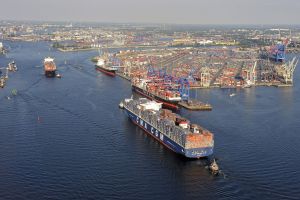Catastrophes, whether natural disasters or terrorist attacks, have serious impacts on man and infrastructure. Professional management of such risks is crucial to a strongly networked national economy such as Germany. Our economy depends on traffic routes and logistics nodes, such as the Port of Hamburg. The impacts of disasters on logistics systems is studied under the project “Risk Management Strategies in Logistics and Infrastructure Networks,” in which economists of the Technical University of Berlin and KIT cooperate with logistics experts from 4flow AG and Kühne + Nagel (AG & Co.) KG.
A complete failure of the infrastructure may endanger the supply of the population and producing enterprises, as was shown by the blockage of ship traffic on the river Rhine in January 2011. Among others, the following questions are answered by the research projects: Which impacts do potential disasters have and how can they be managed? How do logistics systems have to be designed for surviving disasters? Which tasks can or shall be performed by the state in order to ensure the supply of the population and enterprises?
The research project focuses on presently existing and feasible future risk management strategies of logistics enterprises, infrastructure operators, and state institutions, and their impacts in case of various disaster scenarios. Such strategies consider potential disaster scenarios when extending transport networks, safety inventories are adapted, or alternative supply chains are established.
Within the framework of the project, the economic relevance as well as the impacts are evaluated for individual enterprises in order to derive close-to-practice and scientifically founded strategies. New logistics simulation models are developed for analyses on both the company level and the economy level.
The research project will run over a period of three years. It is funded by the Federal Ministry of Education and Research to coincide with their initiatives in Securing the Supply Chain, which is one issue that the Federal Government’s Research for Civil Security program addresses.
In close partnership with society, KIT develops solutions for urgent challenges – from climate change, energy transition and sustainable use of natural resources to artificial intelligence, sovereignty and an aging population. As The University in the Helmholtz Association, KIT unites scientific excellence from insight to application-driven research under one roof – and is thus in a unique position to drive this transformation. As a University of Excellence, KIT offers its more than 10,000 employees and 22,800 students outstanding opportunities to shape a sustainable and resilient future. KIT – Science for Impact.

